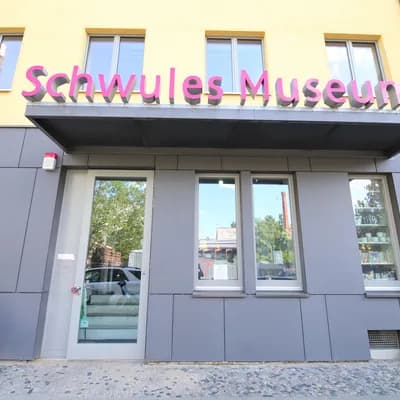
Opening Hours
Memorial for the Gay and Lesbian Victims of National Socialism
In the heart of Cologne, right by the picturesque banks of the Rhine, stands the Memorial for the Gay and Lesbian Victims of National Socialism, also known as the "Pink Triangle Monument." This impressive monument was inaugurated on June 24, 1995, during the celebrations of Christopher Street Day, and is one of the first memorials in Germany dedicated to the victims of this systematic persecution. The memorial serves as a reminder of the cruel history and ongoing struggles of LGBTQ+ individuals who were persecuted during the Third Reich.
Historical Background
During the Nazi regime, homosexuals, particularly men, were rigorously persecuted. Many were criminally prosecuted under the more stringent Section 175 of the German Penal Code, which criminalized homosexual acts. It is estimated that between 10,000 and 15,000 homosexual men were deported to concentration camps, with many meeting the horrific fate of being murdered. The lesbian community, while experiencing less systematic persecution, also faced discrimination. This dark history has shaped the motivation behind the establishment of the memorial, which serves as a place of remembrance and commemoration.
Design of the Memorial
The memorial is simply but meaningfully designed. It consists of pink and gray granite and is in the shape of an upright, equilateral triangle, symbolizing the pink triangle that was used to identify homosexual men in concentration camps. The edges of the monument measure 69 centimeters, rising to a height of 120 centimeters. The inscription on top reads: "Beaten to death – Silent in death / To the gay and lesbian victims of National Socialism," weighing the physical and societal tragedies of the undignified fate of these individuals against each other. The artist Achim Zinkann describes in his design the pressure and counter-pressure that represent cohesion in society – a metaphor for how the disappearance of part of a community can destabilize the rest.
Events and Commemoration
The memorial is not only a quiet place for reflection but is also actively used for commemorative events, especially on the International Day Against Homophobia and during Christopher Street Day. Every year, people gather to commemorate the victims and reaffirm the importance of tolerance and acceptance. Cologne, known for its vibrant LGBTQ+ community, sees this memorial as an important symbol for the recognition of the rights and history of sexual minorities.
Criticism and Maintenance of the Memorial
In the past, there have been some criticisms regarding the visibility and maintenance of the memorial. Many passersby walk by carelessly, unaware of its significance. It is hoped that awareness of the importance of a culture of remembrance and the maintenance of such memorial sites in society will continue to be promoted. Some users have noted that while the memorial is small, it carries great significance – a modest yet powerful place for reflection on the past and the ongoing challenges faced by the LGBTQ+ community.
Visiting Tips
If you wish to visit the memorial, keep in mind that it is located in a very prominent spot in Cologne, easily accessible and free of charge. It is a recommended place for those looking to gain a deeper understanding of the history of LGBTQ+ individuals in Germany. Take a moment to pause and reflect on the painful past while celebrating the importance of equality and acceptance.
Contact and Further Information
For more information, visit the memorial's website: Memorial for the Gay and Lesbian Victims of National Socialism. It is always beneficial to check in advance for events or commemorative days.
Reviews
Visitors to the memorial express mixed feelings about its size and presentation. While some find the modest dimensions too small, many appreciate the profound significance that the memorial embodies. It is an important place of remembrance and is valued as a symbol of remembrance for the discrimination and persecution of LGBTQ+ individuals during National Socialism. Especially during commemorative events, the community's appreciation and commitment to keeping the memory of the affected alive become evident.

Pink Triangle Memorial

Memorial to Homosexuals Persecuted Under Nazism

Gay Liberation Monument

Frankfurter Engel

Berlin's Queer Nightlife Tips - TravelM Style

Pink Christmas 2024 in Munich

The Best LGBTIQ* Christmas Markets 2024

Hamburg: Winter Pride 2024

CSD Pinneberg #pinnepride

Washington Capital Pride 2024 Total Radical

Sitges Pride Gay Village







